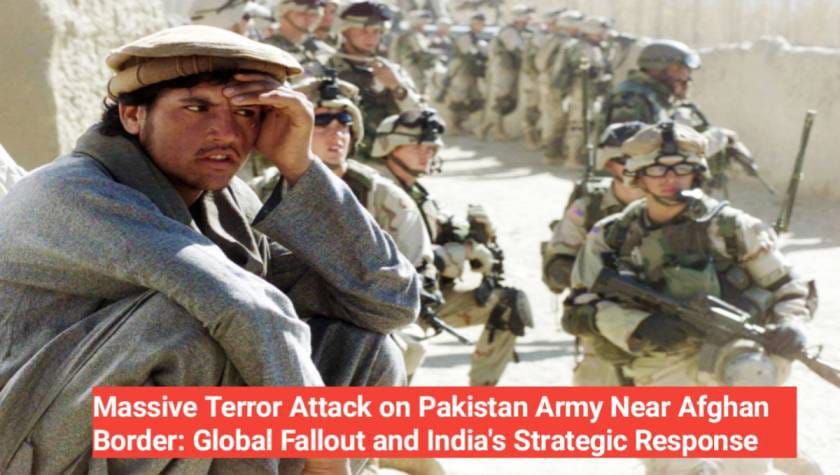
A Major Setback for Pakistan’s Security
Recently, a devastating terror attack shook the Pakistani military in the Khyber Pakhtunkhwa region, close to the Afghanistan border. As international news agencies like AP, Arab News, and major Indian media houses covered the incident extensively, the geopolitical tension in South Asia has surged once again.
Key Incident Summary: What Happened?
| Event | Description |
| Date | June 28, 2025 |
| Location | Khyber Pakhtunkhwa, near Afghanistan border |
| Target | Pakistani Army convoy |
| Mode of Attack | Vehicle-borne explosive device (VBIED) |
| Casualties | Estimated 13–16 soldiers killed |
| Injured | Around 23–35 personnel severely injured |
| Claim of Responsibility | Tehrik-i-Taliban Pakistan (TTP) faction |
Pakistan’s Reaction: Blaming India Without Proof
Following the deadly assault, Pakistan’s military and government made a startling accusation—blaming India for orchestrating the attack. This allegation, lacking substantial evidence, was immediately denied by the Indian government.
India’s Official Statement: “We categorically reject Pakistan Army’s statement blaming India for the June 28 Waziristan attack. These allegations are baseless and contemptuous.”
This response was measured, reflecting India’s consistent diplomatic stand to not engage in provocation without facts.
Global Media Coverage: Why the Incident Matters
The severity of the attack and the political blame game that followed caught the attention of the international community. Think tanks in the West began speculating whether this event could trigger a larger India-Pakistan conflict.
While the possibility of immediate war remains low, strategic analysts observed how General Asim Munir, now Pakistan’s Field Marshal, issued direct threats to India—escalating the narrative.
Who is Field Marshal Asim Munir & Why His Words Matter
Asim Munir is no ordinary figure; becoming the third Field Marshal in Pakistan’s history, his words carry significant weight. His post-attack statement reinforced Pakistan’s long-standing narrative on Kashmir:
“What India calls terrorism is actually a legitimate struggle under international conventions.”
“Without a just resolution of the Kashmir issue, peace in South Asia will remain elusive.”
By glorifying armed struggle in Kashmir and refusing to crack down on terror groups, Asim Munir essentially endorsed proxy warfare—a dangerous precedent.
The Kashmir Issue Reignited
Munir’s speech reignited the Kashmir debate, portraying those engaged in militancy as freedom fighters. He claimed Pakistan would continue offering “political, diplomatic, and moral support” to the people of Indian-administered Jammu & Kashmir.
This viewpoint directly contradicts international consensus and violates the principles of sovereignty and peace.
India’s Security Concerns: The Terror Launchpad Threat
India remains wary of terror launchpads being rebuilt by Pakistan, especially after the success of Operation Sindoor, which dismantled multiple camps.
| Operation | Objective | Outcome |
| Operation Sindoor | Destroy terror launchpads | Successful elimination of multiple camps |
| Post-Op Concern | Rebuilding efforts by Pakistan | Ongoing |
Strategic Solutions: What Should India Do Next?
There is growing discourse around applying the Lebanon Model—a strategy used by Israel to neutralize threats from hostile regions. The core idea is to establish such overwhelming military and economic superiority that Pakistan, or any of its state-sponsored groups, cannot retaliate meaningfully.
Key Steps in India’s Strategy:
- Strengthen Military Capabilities
Increase defense spending beyond $200 billion annually over the next decade. - Develop Precision Strike Readiness
Use satellite surveillance and intelligence to detect and destroy terror bases proactively. - Diplomatic Isolation of Pakistan
Utilize India’s rising global stature to cut off foreign aid and strategic cover to Pakistan. - Economic Supremacy as Foundation
Support this security doctrine with an expanding economy to sustain long-term readiness.
Why Ignoring Pakistan Is No Longer a Viable Option
Although many believe India has outgrown Pakistan in economic terms, the threat from across the border remains real. Pakistan continues to:
- Sponsor terrorism in Kashmir,
- Obstruct tourism and stability in Jammu & Kashmir,
- Attack financial hubs (as seen in 26/11 Mumbai attacks).
Until India neutralizes the roots of terror in Pakistan, sustained progress will always be at risk.
Conclusion: Toward a Permanent Solution
As geopolitical equations evolve, India must transition from a reactive to a proactive doctrine. The Lebanon Model, coupled with strong economic backing and strategic dominance, could be the only sustainable approach to resolving the Pakistan problem.
FAQs
Q1. Did India carry out the June 28 attack on Pakistan Army?
– No. India officially rejected the baseless allegations made by Pakistan.
Q2. Who claimed responsibility for the attack?
– A faction of Tehrik-i-Taliban Pakistan (TTP) claimed responsibility.
Q3. What is the Lebanon Model?
– It is a strategy of using military superiority to prevent terror threats, inspired by Israel’s actions in Lebanon.
Q4. Is war between India and Pakistan likely?
– As of now, geopolitical conditions and statements suggest that direct conflict is unlikely.
Q5. What role does Asim Munir play in this escalation?
– As Pakistan’s Field Marshal, his pro-terror and anti-India rhetoric has worsened diplomatic relations.
Final View:
India must prepare itself not just to defend but to deter. With global support and a strong economy, a future where Pakistan can no longer threaten India’s peace and progress is within reach.
For updates on defense strategy and geopolitical news, keep following mydailymails.in.





